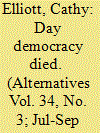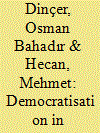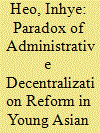|
|
|
Sort Order |
|
|
|
Items / Page
|
|
|
|
|
|
|
| Srl | Item |
| 1 |
ID:
092089


|
|
|
|
|
| Publication |
2009.
|
| Summary/Abstract |
The current fashion for good governance and promoting democracy as an integral element of development is ironically having depoliticizing effects because of its articulation with a technocratic and Westernized vision of what a good society might be like. Proceeding empirically and using texts relating to the assassination of Benazir Bhutto, this article demonstrates how discourses of democracy and development are mobilized in the contemporary international space, enabling the discursive taking of sides: for "democratic development" and against "Islamic extremism," in ways that elide other possible modes of seeing. "Democratic development" constitutes, and is constituted by, a "Western" (and British) identity in ways that are seductive, but also disciplinary: In particular, they turn out to produce and reproduce a particular set of gender relations as well as exhorting British Muslims to "fit in" with this identity. This exclusionary logic also transposes struggle over these power relations into an undemocratic international space. One key consequence of its mobilization is precisely the closing down of space for political resistance through democratic means, which I argue is not only ironically highly undemocratic, but also dangerous.
|
|
|
|
|
|
|
|
|
|
|
|
|
|
|
|
| 2 |
ID:
175528


|
|
|
|
|
| Summary/Abstract |
Instead of writing off the post-uprising period in the Middle East and North Africa (MENA) as a failed attempt at democratisation, this article argues that the region is still undergoing an ambiguous and contingent process in which democratisation survives as one likely path among others. From this alternative viewpoint, the uprisings have multi-faceted, complex and uncertain consequences that constitute the beginnings of a long-term transitional phase in which various forces of political development continue to coexist in competing fashions. We argue that amidst this ambiguous process, the uprisings have introduced game-changing dynamics with regard to democratisation. We further attempt to identify these dynamics and discuss the potential value of the post-uprising experience as an asset for regional democratisation. For this purpose, we underline at least three crucial aspects of the post-uprising experience regarding democratic development in the region: (1) the demonstration of the potential for political change, (2) the contribution to the democratic learning curve, and (3) the emergence of Tunisia as a ‘transition game’. This study aims to serve as a guiding analytical exercise in the study of democratisation within ambiguous political environments, such as the post-uprising MENA region, where identifying the direction of democratisation may prove difficult.
|
|
|
|
|
|
|
|
|
|
|
|
|
|
|
|
| 3 |
ID:
133996


|
|
|
|
|
| Publication |
2014.
|
| Summary/Abstract |
By a number of accounts, NATO's membership expansion has been viewed favorably, with many analysts pointing to the positive impact NATO's enlargement has on the democratic development of civil-military relations across Central and Eastern Europe. Within this context, Mosès Naím's recent essay in Foreign Affairs was especially striking due to his piercing criticism of Bulgaria due to its significant problems with internal domestic corruption. We examine the potential impact of a Bulgarian mafia-oriented society on NATO from three perspectives, which include assessments of Bulgaria's military, its military capabilities-including its recent weapons purchases-as well as its willingness and ability to participate in NATO's major operations. In our view, these measures provide at least a partial assessment of Bulgaria's role within the alliance in an era that parallels claims of widespread corruption. The findings suggest that Bulgaria's corruption does have some impact on its ability to contribute to NATO's major alliance objectives, which apart from the deleterious impact on Bulgaria, also has broader implications for NATO's ongoing interest in membership expansion.
|
|
|
|
|
|
|
|
|
|
|
|
|
|
|
|
| 4 |
ID:
163915


|
|
|
|
|
| Summary/Abstract |
It is generally perceived that administrative decentralization reform in young democracies is a promise to improve democracy from below. Yet, in terms of democratic development, the impact of this process is ambivalent, and can be described as a paradox of reform. This article argues that preemptive countermeasures that offset problems predicted to emerge as the reform proceeds should be formulated as part of the reform through introducing a preventive policy paradigm in the area of democratic reform policy. This is to alleviate or prevent the creation of the paradox and to contribute to democratic development through enhancing people’s satisfaction with the newly democratized government. To this end, this study examines administrative decentralization reform in South Korea and Indonesia and uncovers these reforms’ paradoxes. These two cases are particularly worthy of study, since their young democratic governments lack countermeasures against predictable reform problems, intensifying the paradox. I argue that the implications drawn from these two cases for methods of enhancing democratic development in other young democracies are worth heeding.
|
|
|
|
|
|
|
|
|
|
|
|
|
|
|
|
| 5 |
ID:
138413


|
|
|
|
|
| Summary/Abstract |
This article constitutes a call for solutions to the prolonged and worsening plight of the Rohingya, a largely stateless, Muslim minority based in western Myanmar. Over the past year, a number of experts have invoked the possibility of genocide against this group, citing a dangerous combination of ethnic and religious tensions, discriminatory deprivation of basic rights, restricted access to food and medicine, hate speech, and large numbers fleeing the country. Yet up to now, domestic and international responses to the Rohingya crisis have been weak, with serious consequences for this community, the prospects of democratic transition and rule of law in Myanmar, and the integrity of international law. This article highlights the basis for why the possibility of genocide has been raised and argues that the international community has legal obligations to act. These considerations could contribute to sharpening focus on the urgent need for regionally coordinated solutions, based on enforceable principles of nondiscrimination and inclusion, specifically guarantees of citizenship rights and protection. These are critical elements of democratic development in divided societies like Myanmar.
|
|
|
|
|
|
|
|
|
|
|
|
|
|
|
|
| 6 |
ID:
119422


|
|
|
|
|
| Publication |
2013.
|
| Summary/Abstract |
Over the past twenty years, the Republic of Slovenia has followed the path of intensive democratic development. Becoming an independent state after being one of the Republics of the Former Socialist Federal Republic of Yugoslavia, the country's leadership set important strategic objectives, especially full membership in the European Union and the North Atlantic Treaty Organization (NATO), and achieved quality results in the economic field. Slovenia's development model is still being followed by Western Balkan countries in the aftermath of the brutal wars in this region. Thus, its activities and democratic development are extremely important for the development, stability, and security of the Western Balkan region.
|
|
|
|
|
|
|
|
|
|
|
|
|
|
|
|
| 7 |
ID:
085951


|
|
|
|
|
| Publication |
2009.
|
| Summary/Abstract |
The 2007 General Elections in Trinidad and Tobago have re-affirmed the country's 'one-party dominant system' in which the People's National Movement (PNM) has held power for 41 of the last 52 years, and has been elected to hold five more. Despite significant positive resources for democratic development in Trinidad and Tobago, one-party dominance has weakened Parliament, blurred distinctions between ruling party and government, and created vulnerability and powerlessness for dissenting minorities. These generic hazards have been exacerbated by Trinidad and Tobago's history of Crown Colony government and the 'resource curse'. Since 1986, the PNM's dominance has been fragile, consistently supported by less than a majority of voters. Despite this, the Opposition has remained fragmented for rather petty reasons, as there exist no insurmountable ideological, policy, or ethnic-based differences between them. The major group which refused to join the other forces in 2007 represents a political 'Third Tribe' in Trinidad which constitutes roughly 23% of the country, and has a significant electoral effect in six or seven specific Trinidadian constituencies. In conclusion, it is argued that Trinidad and Tobago requires the political will and maturity to emerge from the dangers of one-party dominance by creating a viable second political force.
|
|
|
|
|
|
|
|
|
|
|
|
|
|
|
|
|
|
|
|
|